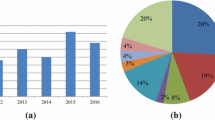Abstract
This paper presents two methods which automatically produce annotated corpora for text summarisation on the basis of human produced abstracts. Both methods identify a set of sentences from the document which conveys the information in the human produced abstract best. The first method relies on a greedy algorithm, whilst the second one uses a genetic algorithm. The methods allow to specify the number of sentences to be annotated, which constitutes an advantage over the existing methods. Comparison between the two approaches investigated here revealed that the genetic algorithm is appropriate in cases where the number of sentences to be annotated is less than the number of sentences in an ideal gold standard with no length restrictions, whereas the greedy algorithm should be used in other cases.
Preview
Unable to display preview. Download preview PDF.
Similar content being viewed by others
References
Marcu, D.: The automatic construction of large-scale corpora for summarization research. In: The 22nd International ACM SIGIR Conference on Research and Development in Information Retrieval (SIGIR 1999), Berkeley, CA, pp. 137–144 (1999)
Edmundson, H.P.: New methods in automatic extracting. Journal of the Association for Computing Machinery 16, 264–285 (1969)
Hasler, L., Orăsan, C., Mitkov, R.: Building better corpora for summarisation. In: Proceedings of Corpus Linguistics 2003, Lancaster, UK, pp. 309–319 (2003)
Kupiec, J., Pederson, J., Chen, F.: A trainable document summarizer. In: Proceedings of the 18th ACM/SIGIR Annual Conference on Research and Development in Information Retrieval, Seattle, pp. 68–73 (1995)
Teufel, S., Moens, M.: Sentence extraction as a classification task. In: Proceedings of the ACL 1997/EACL 1997 Workshop on Intelligent Scallable Text Summarization, Madrid, Spain, pp. 58–59 (1997)
Jing, H., McKeown, K.R.: The decomposition of human-written summary sentences. In: Proceedings of the 22nd International Conference on Research and Development in Information Retrieval (SIGIR 1999), University of Berkeley, CA, pp. 129–136 (1999)
Mitchell, T.M.: Machine learning. McGraw-Hill Series in Computer Science. McGraw-Hill, New York (1997)
Holland, J.H.: Adaptation in Natural and Artificial Systems. University of Michigan Press, Ann Arbor (1975)
Byron, D.K., Allen, J.F.: Applying genetic algorithms to pronoun resolution. In: Proceedings of the Sixteenth National Conference on Artificial Intelligence, Orlando, Florida, USA, p. 957. AAAI Press/The MIT Press (1999)
Orăsan, C., Evans, R., Mitkov, R.: Enhancing preference-based anaphora resolution with genetic algorithms. In: Christodoulakis, D.N. (ed.) NLP 2000. LNCS (LNAI), vol. 1835, pp. 185–195. Springer, Heidelberg (2000)
Barbu, C.: Genetic algorithms in anaphora resolution. In: Antonio Branco, T.M., Mitkov, R. (eds.) Proceedings of the 4th Discourse Anaphora and Anaphor Resolution Colloquium (DAARC 2002), Lisbon, Portugal, pp. 7–12 (2002)
Ke, J., Ogura, M., Wang, W.: Modeling evolution of sound systems with genetic algorithm. Computational Linguistics 29, 1–18 (2003)
Han, B.: Building a bilingual dictionary with scarce resources: A genetic algorithm approach. In: Proceedings of the Student Research Workshop, the Second Meeting of the North American Chapter of the Association for Computational Linguistics (NAACL 2001), Pittsburgh, USA, pp. 14–19 (2001)
Yang, J.J.: Use of Genetic Algorithms for Query Improvement in Information Retrieval Based on a Vector Space Model. PhD thesis, University of Pittsburgh, Pittsburgh, PA (1993)
Loose, R.M.: Learning syntactic rules and tags with genetic algorithms for information retrieval and filtering: An empirical basis for grammatical rules. Information Processing & Management 32, 185–197 (1996)
Mitchell, M.: An Introduction to Genetic Algorithms. In: Complex Adaptive Systems. MIT Press, Cambridge (1996)
Author information
Authors and Affiliations
Editor information
Editors and Affiliations
Rights and permissions
Copyright information
© 2005 Springer-Verlag Berlin Heidelberg
About this paper
Cite this paper
Orăsan, C. (2005). Automatic Annotation of Corpora for Text Summarisation: A Comparative Study. In: Gelbukh, A. (eds) Computational Linguistics and Intelligent Text Processing. CICLing 2005. Lecture Notes in Computer Science, vol 3406. Springer, Berlin, Heidelberg. https://doi.org/10.1007/978-3-540-30586-6_75
Download citation
DOI: https://doi.org/10.1007/978-3-540-30586-6_75
Publisher Name: Springer, Berlin, Heidelberg
Print ISBN: 978-3-540-24523-0
Online ISBN: 978-3-540-30586-6
eBook Packages: Computer ScienceComputer Science (R0)




